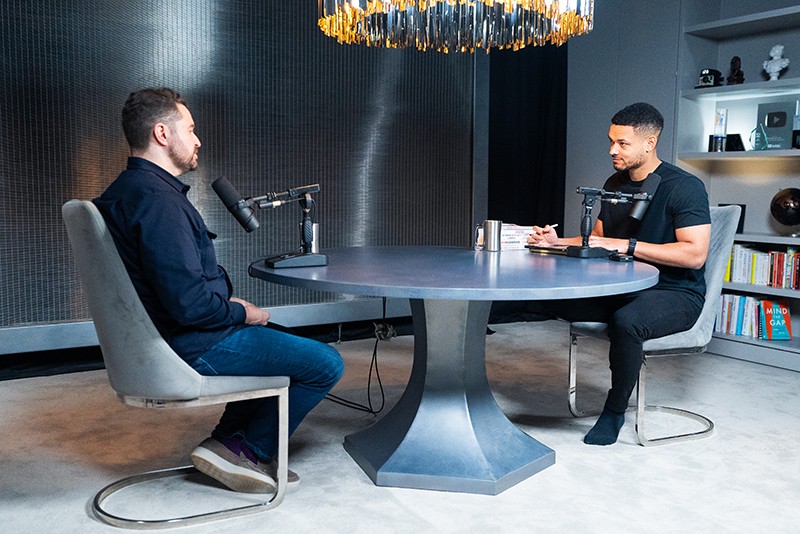You've probably heard the name Steven Bartlett floating around if you're into business podcasts or entrepreneurship content. This guy's story is wild - he dropped out of university with nothing, started a business from his bedroom, and somehow turned it into a multi-hundred-million-dollar empire. Now he's the face behind Diary of a CEO, one of the biggest podcasts on the planet with over a billion streams. But what makes his story interesting isn't just the money. It's how he got there - through failed projects, sleeping on floors, and basically betting everything on himself when nobody else believed in him.
Steven Bartlett's First Steps: From Broke Student to First Paycheck

Steven's entrepreneurial journey started pretty rough, honestly. At 18, he bailed on Manchester Metropolitan University after just one month. His family thought he was crazy. His friends probably did too. But Steven had this idea that wouldn't leave him alone.
He created Wallpark, basically a social platform for students to connect, share events, and sell their old textbooks to each other. Sounds simple, right? Problem was, it wasn't making him any real money. He was struggling to pay rent and had to take a sales job he absolutely hated just to survive. But looking back, those brutal sales days taught him skills that would become super valuable later.
Between 19 and 21, Steven landed a gig working with the Bebo team in San Francisco. Remember Bebo? The social network that sold for $800 million, then got bought back for literally one dollar? Yeah, that one. Steven worked on rebuilding it, learning everything he could about social media growth and what makes platforms tick. The paychecks weren't amazing, but the education was priceless.
Building Social Chain: The Diary of a CEO Founder's Career Breakthrough

Everything shifted in 2014 when Steven was 22. While trying to make Wallpark work, he stumbled across this Twitter account run by a student named Dominic McGregor. Dom was posting hilarious student memes and relatable content that had thousands of followers eating it up. Steven saw something others didn't - a way to connect brands with young audiences through these massive social media followings.
He reached out to Dom, pitched his vision, and together they started Social Chain with around £300,000 from investors. Their first client was a mobile game called Tippy Tap. The campaign absolutely crushed it - the app shot to the top of the app store and even made BBC news. That's when they both realized they were onto something massive.
Within five years, Steven became a millionaire at 23. Social Chain exploded, landing huge clients like Apple, McDonald's, Microsoft, and Coca-Cola. The company grew across London, Manchester, Berlin, New York, and Los Angeles. By 2019, Social Chain merged with a German company and went public on the stock exchange with a valuation north of $200 million.
Reaching the Peak: When the Diary of a CEO Host Hit His Stride

By November 2021, Social Chain hit a $600 million valuation on the Frankfurt Stock Exchange. Steven was only 27 when he stepped down as co-CEO in 2020, though he kept a big chunk of shares in the company.
But here's where it gets interesting. Back in 2017, while still running Social Chain, Steven started the Diary of a CEO podcast basically as an experiment. He just wanted to document his thoughts and maybe interview some interesting people. By 2021, that "experiment" was pulling in $1.2 million a year from sponsorships alone.
The podcast absolutely took off. By December 2024, it had passed one billion total streams with 50 million people tuning in monthly. Companies like LinkedIn, Oracle, and Shopify were lining up to sponsor episodes. The whole Diary of a CEO brand - including the podcast, events, books, and merch - brought in $20 million in revenue last year.
In 2021, at 28 years old, Steven became the youngest investor ever on BBC's Dragons' Den (basically the British version of Shark Tank). Suddenly he wasn't just a successful entrepreneur - he was a household name.
Steven Bartlett's Net Worth and Current Success

So what's the Diary of a CEO guy actually worth? Depending on who you ask, estimates range from £29 million to $50 million. Forbes put him on their 2025 Top Creators list and ranked him 9th globally for creator earnings.
In October 2025, Steven closed a massive investment round for his holding company Steven.com at a $425 million valuation, and he still owns over 90% of it. The company owns all his creator assets - the podcast, media properties, and various business ventures.
Beyond the podcast, Steven's invested in over 40 companies including SpaceX, Huel (that meal replacement company), and a bunch of health and tech startups. He's also co-founded Thirdweb, a platform for building web3 apps that's valued at $160 million.
Key Success Principles from the Diary of a CEO

Steven's built his whole brand on sharing real, actionable wisdom about success. Through his podcast and books, he's taught millions of people his core principles:
- Fill Your Five Buckets in Order. Steven talks about five buckets everyone needs to fill: Knowledge, Skills, Network, Resources, and Reputation. Most people chase money and fame first, which is completely backwards. You need to start with learning and skill-building. That foundation is what keeps you standing when everything else falls apart. Knowledge, when you actually apply it, becomes power.
- Consistency Beats Intelligence. Here's one of Steven's best insights - success is about 5% brains and 95% consistency. You don't need to be the smartest person in the room. You need to show up every single day and keep pushing forward. With the Diary of a CEO, he focused on improving just 1% every day. Those tiny improvements compound over time until suddenly you're number one.
- Out-Fail Your Competition. Steven doesn't run from failure - he embraces it. The companies and people who succeed aren't the ones who never fail. They're the ones who fail faster, learn quicker, and keep experimenting. If you're not failing regularly, you're probably not taking enough risks.
- Go All In on Plan A. This one's controversial, but Steven believes having a backup plan can actually hurt you. When he dropped out of university, he had no Plan B. That forced him to make his business work no matter what. When failure isn't an option, you find resources and determination you didn't know you had.
- Accept Uncomfortable Truths Quickly. The faster you can accept uncomfortable truths, the faster you'll succeed. When you refuse to face reality - whether it's about your business, your relationships, or yourself - you're just choosing a more uncomfortable future. The companies that ignored the shift to digital? They died. The people who face hard truths head-on? They adapt and survive.
- Build a Strong Culture. Every company is really just a recruiting company. Your job as a leader is to find amazing people and create a culture that brings out their best work. Steven famously put a giant blue slide in his Social Chain office before they even had desks. Why? Because it screamed "we're different, we're young, we think differently" louder than any marketing campaign could.
Steven Bartlett's journey from sleeping on friends' couches to building the Diary of a CEO empire shows that unconventional paths can lead to extraordinary results. You don't need a degree, rich parents, or connections. You need knowledge, consistency, the guts to fail, and the courage to bet on yourself when nobody else will.
 Sergey Diakov
Sergey Diakov

 Sergey Diakov
Sergey Diakov


